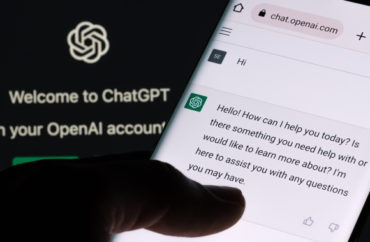
Professor laments ‘society-wide failure to value education for its own sake’
Perhaps the biggest question puzzling academics today was the subject of a lengthy new article in New York Magazine: How do we handle artificial intelligence in the classroom?
“Everyone is cheating their way through college,” the article began, followed by several anecdotes from students who think nothing of having ChatGPT do their assignments for them.
A freshman named Wendy, who goes to a “top” university, told the magazine that she enjoys writing, but she relies heavily on AI to write essay assignments because it gets her better grades.
“An essay with ChatGPT, it’s like it just gives you straight up what you have to follow. You just don’t really have to think that much,” she said.
One of Wendy’s AI-written essays, which the magazine reviewed, was about “critical pedagogy, the philosophy of education pioneered by Paulo Freire. The philosophy examines the influence of social and political forces on learning and classroom dynamics. Her opening line: ‘To what extent is schooling hindering students’ cognitive ability to think critically?’”
When asked about the irony of the project, she replied: “I use AI a lot. Like, every day. And I do believe it could take away that critical-thinking part. But it’s just — now that we rely on it, we can’t really imagine living without it.”
But some professors are requiring students to.
A recent College Fix article highlighted a number of professors who have gone back to no-technology classrooms, some requiring assignments and tests in pen and paper. Cheating isn’t the only issue, either. Many say technology also has hindered students’ social and mental development.
Michigan State University history Professor Helen Veit said her classrooms have become “much richer, more interesting, more human, and happier” as a result.
Corey Moss-Pech, a sociology professor at Florida State University, offered a similar response to the magazine article this week.
“I know it’s not a popular position but I’m really convinced old fashioned reading and lecture/discussion is the best way to get students to learn,” he wrote on X.
A University of Wisconsin at La Crosse political science professor’s answer was even simpler.
The solution: https://t.co/xw0P0Wve2C pic.twitter.com/YhoXmqtL83
— Anthony Chergosky (@achergosky) May 7, 2025
Others told the magazine they believe academia needs to make drastic changes in order to deal with AI.
Professors are up against lazy and sometimes even defiant attitudes from students when it comes to actually putting in the work – with some students using AI even for personal reflection essays about themselves.
For example, one philosophy professor at the University of Arkansas at Little Rock “caught students in her Ethics and Technology class using AI to respond to the prompt ‘Briefly introduce yourself and say what you’re hoping to get out of this class,’” according to the report.
In another case, former Columbia University student Chungin “Roy” Lee admitted that he would “dump” class assignment prompts into “ChatGPT and hand in whatever it spat out.”
“Most assignments in college are not relevant. They’re hackable by AI, and I just had no interest in doing them,” Lee told New York Magazine.
“I think we are years — or months, probably — away from a world where nobody thinks using AI for homework is considered cheating,” he said.
Asked why he decided to attend an Ivy League school, he replied, “It’s the best place to meet your co-founder and your wife.”
He was suspended in March for “advertising a link to a cheating tool,” according to the report.
The article prompted responses from a number of professors and scholars on social media.
In a series of posts on X, Northeastern University Professor Matthew Smith said he believes professors should start by instituting no-screen policies, and requiring handwritten notes and physical projects. Subsidizing books, not screens, was another suggestion of his.
However, the philosophy professor said attitudes about education also need to change.
“The rampant use of ChatGPT is due in part to a society-wide failure to value education for its own sake. By treating a pure means to an end – wealth – as a final end, we have ethically crippled a generation,” Smith wrote.
“We treat education purely in terms of its ‘value proposition.’ High school is just a means to get into college and college just a means to get a fancy job,” he wrote. “Children are raised from birth not to find wonder in the world. We teach them to look only for tools for future wealth.”
In March, The Fix also reported on how the emerging prolific use of AI is prompting some students and scholars to argue that too much reliance on the technology could damage students’ ability to think critically and reason.
MORE: Some professors return to pen and paper, tech-free classrooms
IMAGE CAPTION AND CREDIT: An individual uses the artificial intelligence software ChatGPT. Ascannio/Shutterstock
Like The College Fix on Facebook / Follow us on Twitter







Please join the conversation about our stories on Facebook, Twitter, Instagram, Reddit, MeWe, Rumble, Gab, Minds and Gettr.